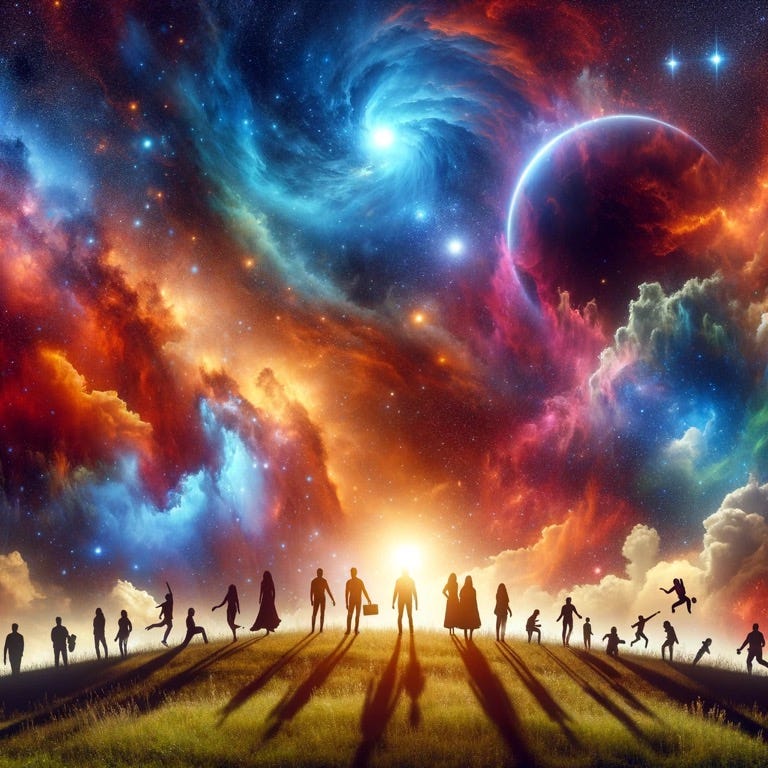Are street lamps communist?
Is cyberspace anonymity the way to true freedom?
Is the accumulation of loads of moolah by the nimble and financially sure-footed an automatic good akin to virtue?
Ok Dave, what are you on about?
After letting my brain switch off for a bit, I’ve spent some of that dreamy, lethargic Twixmas break between Christmas and New Year diving into an old book I’ve been meaning to read for a long time.
The Sovereign Individual by James Dale Davidson and Lord William Rees-Mogg.
Yes, it’s no coincidence. William is the daddy dearest of Jacob Rees-Mogg, Victorian Britain’s human-shaped telegram explaining that time travel is possible.
The Sovereign Individual was published in 1997 and has been hailed for its prescience in predicting many things about the rise of the ‘cybereconomy’ and the role digital currencies might play in the demise (or at least demotion) of the nation-state as an all-powerful entity in our lives.
Plucky individuals will rule the future (meaning, now) and state institutions will be left scrambling for revenue, authority and relevance, in that order. We will be able to earn money and shop in a universal no man’s land beyond the reach of national laws or taxes.
And yet, and yet.
Don’t get too comfortable in your smugness that this hasn’t quite eventuated unless you’ve moved to Dubai as a YouTuber.
Davidson and Rees-Mogg were unintentionally onto something, but not because I agree with their premise or politics. More that theirs is an unfinished polemic, a mid-sentence fade out. They managed to articulate all the unspoken anger at nation-state overreach but none of the solutions, instead assuming that super-duper, free-range individuals will solve a number of incredibly complex local and geopolitical problems just because.
Hang in there. As always I have a point and I’ll do my best to get there without too much sightseeing along the way. Who am I kidding? Let me show you the long way. It’s more interesting:
Hey you! Get out of my light!
Street lamps are a classic example of their blind spot but it applies to all public goods:
In a total Sovereign Individual society, street lamps might not be provided efficiently because of the free-rider problem.
If a street lamp is installed, everyone can benefit from it without necessarily contributing to its cost. You might install a street lamp outside your home but you can’t stop people benefiting from its illumination across the sidewalk as they pass. You might not easily get them to pay a toll either.
Since individuals may choose not to pay, hoping others will, the street lamp might never be erected due to insufficient funding. This is problematic because well-lit streets can reduce crime and accidents, benefiting the community.
Unless you deploy security to make sure the great non-paying masses are not using your lamp light, individuals can’t make them happen.
Coordinating the placement of street lamps, deciding on their brightness, and their maintenance schedule requires collective decision-making. In a society strictly adhering to Sovereign Individual principles, private entities on their own can’t do this because there’s no incentive to address these broader concerns.
But maybe that’s because we’ve built things all wrong and inefficiently.
So let’s say we wanted to start again on our own little island where super smart and wealthy individuals were all sovereignty and stuff. Someone sells us our little plots of land and we get to work (try not to talk about how the laws for this stuff exist or how it is enforced).
We build our homes with nice big compound walls for security and composting toilets to avoid sewage and it’s all connected to the Wonderful Weird Web thing where we work by plying our knowledgeable wares and making tech reviews or yoga videos and trading in crypto.
The garbage piles up outside the compound gate.
The freshly built roads need clearing after a storm.
The disputes between neighbours over obstruction of views, flyover rights in private helicopters or drones and use of private street lamps by passers-by go unresolved and increasingly toxic.
It’s a low-level, pre-apocalypse Oryx & Crake.
Then some wag suggests that services like refuse & recycling management, a dispute tribunal and road maintenance could be bundled together in a single island-wide fee, payable by everyone.
You mean like, a, a tax?!
Someone else mentions the awkward fact that even if this was just a fee, there was no easy way to pay a fee because they all used different crypto currencies and no one would know how much was the correct amount.
So they create a unique token for the island that must be used to pay the fee. At first they couldn’t hire anyone to do the work because no one wanted to work for this valueless token so they asked that the token also be a currency for anything on the island. A local economy based on the token emerges.
Over time, they realise that it sets a really bad precedent to allow the fee to be optional so they include additional fees for late payment or avoidance and eventually a security team to enforce payment (or at least to be a credible threat). This meant people started using the token for absolutely everything on the island because they needed to have some to pay the fee anyway and besides everyone on the island was now a captive audience for this new money.
The value of it soared.
Being good sovereign individuals, some started hoarding it which made it go up even more.
To stop the island from running out of the local token due to hoarding, the issuer decided to make some more.
You can see where this is going.
What am I saying?
The future isn’t what it used to be
The truth is that universal citizenship may well start with us all as just the nihilistic consumers we currently are, buying global products and services. But at some point (soon) we’re going to need a universal, democratic platform to decide on the things that nation-states cannot and do not have the legitimacy to decide on. And yes, it will result in a form of governance.
But it doesn’t need to mimic nation-states in how it’s set up or run. So there’s that. We don’t get to solve the problem of nation-states by retreating to individualism, comfortable and familiar as it may seem.
Also, their now outdated concept of weakening states was based on the idea that revenue must be collected from taxpayers before states can spend like the island example. Davidson and Rees-Mogg were still living with the idea that money was like gold.
Instead, as the pandemic proved, it’s the opposite. In the post-gold-standard world, the state can and must spend fiat money into existence first as a matter of self-preservation to provision itself.
What this means is that there is no liquidity crisis (except in our heads due to uncle advice-level propaganda) and there won’t be any time in the future unless we give in and Samson-like pull the temple down on our heads.
The state only needs to then tax a certain portion of it back to manage inflation and to ensure widespread coercive use of the currency. What is left over - the deficit - is all the private money that Davidson and Rees-Mogg are desperate to funnel into the ‘cybereconomy’ for safe hoarding where the process of civilisation simply starts again.
Or doesn’t. Because Davidson and Rees-Mogg don’t want a solution to the problems of the nation-state. They want a permanent escape. The book anticipates a future where individuals could choose their jurisdictions based on tax advantages, leading to a form of competition among states to offer more favourable tax environments, turning nations into lifestyle brands if you’re wealthy or clever enough.
Seen in this context Sovereign Individuals are just talented hoarders who don’t want to see any of their money burned as tax. But everyone else (those non-elite, less sovereignty proles), well taxing them is fine.
There are certainly some remarkable observations though. I’ve added some current world reactions where relevant:
1. The Digital Economy: In a world where the internet reigns supreme, we have seen the birth and explosive growth of a digital economy. Transactions now happen in cyberspace, sidestepping the traditional borders and controls of nation-states. This evolution mirrors the global spread of e-commerce and digital platforms.
However - nation states are learning to capture this information though KYC and anti-money laundering laws.
2. The Cyber Currency Revolution: Just as predicted, digital currencies have risen, challenging the age-old supremacy of traditional fiat money. The widespread ‘adoption’ of cryptocurrencies, Bitcoin being a prime example, is a clear sign of this digital financial transformation.
However - Sam Bankman-Fried. And also ‘adoption’ is generous to say the least. Speculative hoarding does not a currency make.
For more on SBF and an entire ensemble of fraudulent characters check out ‘Number Go Up’ by Zeke Faux.
3. Remote Work and Global Talent Pools: The prediction of a decentralized workforce has become our reality. Information technology has enabled remote work, creating a global marketplace for jobs. This shift has connected talents from every corner of the globe, fostering a truly international job market.
However - How do you compete with someone who can charge less because they have much lower living costs in the Philippines? Welcome to the price of disruption.
4. Governments as Service Providers: Governments are evolving, now treating residents more like clients than subjects. This change, driven by the autonomy and mobility that technology provides, is evident in how nations are competing to attract businesses and skilled individuals.
However - that is the one-way traffic of the super-talented in most cases. Not many people can ‘switch brands’ just because they’ve been made to wait in a customs queue for too long. We are still prisoners of citizenships that are very difficult to change.
5. Empowerment of the Individual: There’s been a significant shift towards individual autonomy and influence, independent of traditional state systems. This is most evident in the rise of personal branding and the influence exerted through digital platforms, validating the prediction of increased individual power.
However - this supports just the top tier of influencers. Most who attempt this are also holding down full-time jobs. Even though there are a huge number of niches, there’s really only room for a relative few to succeed.
6. Redefining Employment: The labor market is undergoing a metamorphosis. Traditional employment models are being challenged, necessitating a shift in skills and adaptability. This is reflected in the burgeoning gig economy and the continuous need for skill development and learning.
However - also see: The rise of anxiety, zero hour contracts and industrial scale burnout of people who have attempted the break for freedom through self-employment and failed.
Like many futurists looking at the future, their predictions reveal more about them than the future that unfolds.
The great conceit of The Sovereign Individual, though, was to posit the author's political indulgences as evolutionary fact. This was going to happen, because.
I’ve done this in my book as well but at least I presented a variety of outcomes rather than the one I want most.
Because economics, politics and culture do not submit to the same evolutionary forces that Darwin used to lay waste to the Old Testament. We are designers of our social structures (whether conscious or unconscious) and so we are highly suggestive to popular ideas about how the future will happen.
And these guys knew it.
By pitching the book as a look behind the wizard’s curtain of inevitability, they gave license to every ambitious, libertarian and libertarian adjacent cyberpunk who dreamed of unshackling themselves from the responsibilities of civilization.
Aye aye, mateys! Hoist the anchor, ye scurvy dogs! Let's shove off from these lily-livered landlubbers! Pay no heed that they toiled like bilge rats to craft this fine vessel to explore for the good of us all! Avast and set sail!
We’ve created both nation states and the mess we’re in but we don’t get to get out of them by simply retreating into self-indulgent silos.
Human beings are a social and technological species that organise around agreeable myths. The nation is a deeply imperfect one, like the tribal myth that came before it but we won’t be able to discover new lands by casting ourselves adrift as individuals. We need to get comfortable with thinking bigger than that.
The next step in our civilisation awaits and it’s universal. About that much I agree with the authors of The Sovereign Individual. But we’d be wise to start planning for it to be democratic otherwise there are plenty of little tyrants gearing up to take over.










That's an excellent argument! I've had a number of discussions with libertarian anarchists and the books they recommended. You've described the rationale behind the lack of a viable solution for that perspective well. All of the solutions they have described are just pieces of an illusion just as we live in an illusion of democracy now. It would be even easier for the power elite to be in control through shear force.
My thinking continually comes back to power. Anyone who has great power from great wealth will control everyone else because they can afford to buy the force to get what they want. That happens now also. But there are some laws that protect us from them that sometimes work depending on how far up the food chain they are. But in the liberal anarchy scenario, it would be might makes right. I have yet to hear an argument that dispels that.
In reality, there is only one power great enough to protect the masses. That is the unified power of the masses. Studies and experience in collective intelligence demonstrate that the masses also have the greatest ability to solve complex National problems. I believe that a direct democracy that uses a better method than yes/no voting, that provides a solution process that optimizes the collective intelligence while controlling emotions, and that prevents external influence from corporations, political parties, and the wealthy elite would be a better governing system.
And by the way, you really do have a gift. I love your writing style!
I want to be just like you when I grow up.